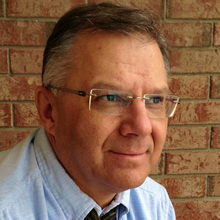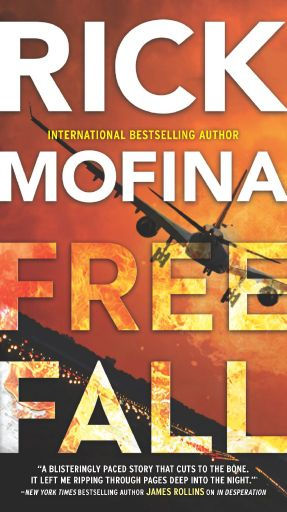Free Fall by Rick Mofina
Hailed as “one of the best thriller writers in the business” by Library Journal, Rick Mofina is the acclaimed author of 19 novels and many short stories. Mofina writes standalones and four series (Reed-Sydowski, Jason Wade, Jack Gannon and Kate Page). He has garnered numerous nominations and awards, including the Arthur Ellis Award for Best Novel in 2003 for Blood of Others. A 30-year veteran journalist for the Ottawa Citizen, Calgary Herald and Southam News wire service, among others, Mofina uses his journalistic experience to write tight, white-knuckle thrillers.
Reporter Kate Page returns in Mofina’s latest thriller, FREE FALL, a terrifying race against time as airplanes start falling out of the sky for unknown reasons. Kate Page is a tenacious heroine who can’t let go of a story even when it isn’t supposed to be hers. In FREE FALL, she butts heads with her editors, the NTSB and law-enforcement officials who believe pilot error is to blame for the mishaps. And when the untraceable masterminds behind the nefarious plot select Kate as their mouthpiece, she too becomes a target.
FREE FALL is great stuff. The kind of thriller that keeps you up late into the night reading. It also might well leave you cursing the author for scaring you to death.
You have a long history in journalism. That shows in your descriptions of the investigative reporting process. This is the fourth book in the Kate Page series. And you’ve written three other series, all featuring reporters. Can you talk about your work history and how it shapes your fiction?
I’ve been writing fiction since I was in grade school. I went to university to study English literature and journalism, hoping to find a job in the news business with the aim of gaining experience that would serve my fiction. It all came together for me when I was assigned to my newspaper’s crime beat. Unless you’ve done this kind of work, nothing prepares you for it. You see what cops, paramedics, firefighters, emergency experts see. For me, as a reporter by day, novelist by night, a light had been switched on. Covering human tragedies and dramas up close was overwhelming. But on another level, having a university degree in English literature and journalism, and having studied courses such as Religious Responses to Death and American Detective Fiction, I felt I was equipped to try to make sense of what I was experiencing. To try to convey through fiction, the truths I’ve learned.
And while we’re on the subject of reporting, you do a marvelous job of painting the politics and rivalries in a tense newsroom. Was Kate Page’s experience the same as yours in this regard?
Oh, maybe a little bit in some ways. All newsrooms have their professional dramas and some have evolved into myths and legends on professional grapevines. You know, you see things, you hear about things, who screwed up, who screwed who, who got punched, who faked a story, who hurled a Christmas tree across the newsroom, the internecine wars, everything you can imagine and everything you can’t. It can serve as inspiration for the melodramatic aspects of a story.
I imagine journalism has changed quite a bit since you got your start. Will Kate Page still have a job in a year or two?
The business is changing everyday. Stay tuned.
You clearly did a lot of research on avionics and navigation systems for FREE FALL. Can you discuss when too much technical information is too much? Does it ever interfere with your storytelling?
With a background in reporting, I’m inclined to ensure my stories, especially this one, are grounded in reality. I mean credible fiction evolves from the truth. Still, you have to constantly measure the research you put into the story without overwhelming the reader. You could say FREE FALL does drift into the realm of a techno-thriller, but the technical information is key to the detective work propelling all the characters, who’ve been carefully drawn. Once you build a good technical foundation, then you can let the characters, with all of their dimensions, grapple with the “what-if” cards while time ticks down on them.
I always like to ask writers about the moment. The moment you landed your agent. Or the moment your agent called you with an offer from a publisher. Or was it something else? Tell us yours.
I was working as a reporter at the Calgary Herald while secretly writing my first crime thriller, If Angels Fall. It had taken a few years to complete and polish the story then a year to land a New York agent. Milly was her name. She loved the book, said, “I think I can place it,” and took it on. Month after month passed with rejection after rejection. I went to work at the paper one morning thinking about whatever crime story I was working on when my wife called me in the newsroom to say, “You just got a fax from Milly!” I knew by the excited tone in my wife’s voice, it was good news as she read it. “We have an offer for Angels, can you call to discuss?” I immediately called Milly. She told me a New York publisher wanted the book and had made an offer, but I cut her off: “Milly, can I buy a new car, or can I get my brakes fixed on my old one?” She paused and said: “You can get your brakes fixed.” After that I really didn’t hear her as she discussed what was to happen next – a call from the editor, deadlines, revisions, etc., because I was so elated as I thought back along my life as a kid writing and typing short stories, sending them off to magazines whose listings I’d found in The Writer magazine. I thought of all the other abandoned novels and efforts, the long road, and how at last, decades later, I was going to have a published novel and get my brakes fixed.
Aside from numerous nominations and awards, including the Arthur Ellis Award for Best Novel in 2003, you’ve received effusive praise from James Patterson, Michael Connelly, and Dean Koontz among others. Our readers are always interested in how these things happen. Can you discuss the thriller writers’ community? Specifically the support and exchange of ideas with other writers?
I never knew how blurbs worked until my publisher asked me early on to help secure them. I had no idea what they were and how to go about it. After it was explained to me, I personally wrote to authors whose work I respected and admired and made a sincere, heartfelt request. Of course they had absolutely no obligation to even acknowledge my request. Other than being a fan, I was a stranger to them. Some never responded, some did but declined my request very politely (one or two were snarky) and others came through. That’s how it worked every time I requested. Later, whenever I had the chance to meet them, I thanked them in person. In my experience I’ve found all writers I’ve met to be collegial and supportive and thriller writers, those who attend ThrillerFest were always approachable and generous. Now when I get asked to endorse someone’s work, I’ll do my best to consider (if time allows) obliging and paying it forward.
What about your writing process? Our readers are always interested in knowing how successful writers do it. Do you have set times every day when you write? Morning? Evening? Are you a plotter? A pantser?
In addition to writing thrillers, I have a full-time day job, so I have a fairly regular routine I’ve followed ever since I got my first publishing contract. I get up about 3:00 a.m., it takes me a while to fully wake. When I do I review the previous days work and notes I’ve made. I’ll make new notes. Then by 5:45 I start my one-hour bus commute to my office. By then I’m usually fully away and working hard on new notes on scenes, storylines and where the chapter should go. At work, I put those notes away and repeat the routine on the commute home. Then in the evening, after supper, I’ll take a walk and review the story in my head, then do whatever research I need in the early evening before knocking off and watching some TV. At bedtime, I’ll review and make notes again and read whatever research material I need to read before I go to sleep. I do this five days a week.
On weekends, I’ll turn those notes into chapters. I usually work all morning, take a walk at lunch and work a bit more in the afternoon before closing the shop. By the time the weekends arrive I usually know where I’m going and what I need to do with the book. There are days I’m exhausted and would like to take a weekend off, but I can’t lose the time. I’ve got a contractual obligation to meet a deadline with the absolute best I can give. The notes I’ve made during the week are invaluable. I will also write when I’m on the road to conferences/book events. I may not get a lot done but I find it is critical that I “stay in the book.” So I’ll read and work on notes in pre-boarding, on the flight, early in the morning in the hotel.
If I have time and it’s going well, I’ll stay in my room for much of the morning and work. I always try to plan ahead so I always know, or have a good idea on where the story is going, what’s needed next, that sort of thing. I will refer to my outline. I am a plotter. I’ve always been a plotter. In fact, my publishers prefer to buy into an outline, then I use it as reference. For me they’ve run from seven to sixty pages, it is up to me. That’s my process. The outline is not the book. There will be changes, but the outline does serve as a guide when I’m lost. However, I can abandon it when I know exactly the detour I need to take. This process has served me well. I am now starting my 22nd thriller.
You’ve written standalones and four series, including the Reed-Sydowski, Jason Wade, Jack Gannon, and Kate Page. What’s next for Rick Mofina?
I’ve just completed Before Sunrise, a dark short novel that will be released as an eBook in the months ahead. I’ll be starting the draft of a new standalone thriller by the time people read this.
*****
 Rick Mofina is a former reporter who has interviewed murderers on death row; flown with the LAPD over L.A. and patrolled with the Royal Canadian Mounted Police near the Arctic. He’s also reported from the Caribbean, Africa, and Kuwait’s border with Iraq. He’s written 20 thrillers that have been published in 30 countries. He’s a four-time Thriller Award nominee; a two-time Shamus award nominee, and the winner of Canada’s top prize for crime fiction, the Arthur Ellis Award.
Rick Mofina is a former reporter who has interviewed murderers on death row; flown with the LAPD over L.A. and patrolled with the Royal Canadian Mounted Police near the Arctic. He’s also reported from the Caribbean, Africa, and Kuwait’s border with Iraq. He’s written 20 thrillers that have been published in 30 countries. He’s a four-time Thriller Award nominee; a two-time Shamus award nominee, and the winner of Canada’s top prize for crime fiction, the Arthur Ellis Award.
To learn more about Rick, please visit his website.
- LAST GIRL MISSING with K.L. Murphy - July 25, 2024
- CHILD OF DUST with Yigal Zur - July 25, 2024
- THE RAVENWOOD CONSPIRACY with Michael Siverling - July 19, 2024

